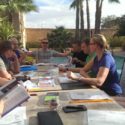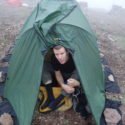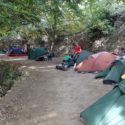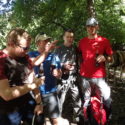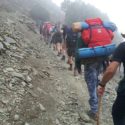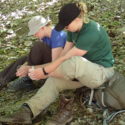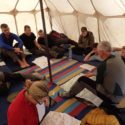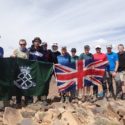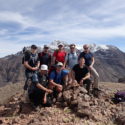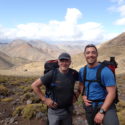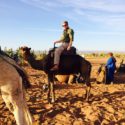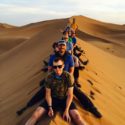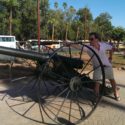From the 26th September to the 11th October 2015 the Royal Yeomanry completed an Adventurous Training expedition in the High Atlas Mountains in Morocco. The main effort of the expedition was to traverse a section of the High Atlas between the Tizi-n-Test pass the the Tizi-n-Tichka pass and hoping to bag as many peaks as possible. Whilst the circular routes round Mt Toubkal are well trodden the beginning and end days of our trek were across less used tracks giving the expedition a slight air of exploration. The Atlas range being the highest and longest mountain range in northern Africa this was to be a rocky feat to achieve on foot.
The expedition was conceived, planned and executed by the Regimental Adventurous Training Officer, Captain Jules Ward, with Major Dave Larkam (East Midlands University Officer Training Corps) and Flt Lt Chris Fawcett (RAF) as our Summer Mountain Leaders. The Ulysses Trust funding helped to make it a trip that was affordable to all ranks. Our intrepid group consisted of eleven personnel of mixed rank, eight of whom were total novice mountaineers. The expedition definitely met with its secondary aim to enthuse us to wish to undertake further challenges with many discussions on where people would like to go and what activities they would challenge themselves with. Equally on our return the buzz has led to several others who had been unable to attend due to annual training period commitments commencing planning.
The journey east
Flying from London to sultry Agadir on the Atlantic coast, we travelled east to the ancient walled city of Taroudant where we stayed for a day in a small, colonial era hotel (Morocco was a French colony until 1956) for acclimatisation and briefings – with a particular focus on the signs and symptoms of Altitude Mountain Sickness (AMS) – but with plenty of water rugby and volleyball between lectures. Being woken very early the next morning by the adhan, the Islamic call to prayer, reminded one that we were now in a profoundly Muslim country. The small town gave us our first taste of Moroccan architecture as well as cuisine.
From Taroudant, we drove east again all morning into the Atlas Mountains themselves where we met our mules and porters who were to ferry our tents and larger bags from camp to camp over the next nine days. It may be an overused cliché but Morocco really is a land of contrasts: a whole day trekking in the heat through a desolate, arid landscape of brown rocks and scree would change suddenly as we descended in the evening into lush, fertile villages at the bottom of a valley abounding in orange and date trees. Although it was early autumn the temperature was still in the mid thirties in the shade most days, making walking distinctly on the warm side and the consumption of large quantities of water vital. Whilst a couple of the Moroccans sustained minor injuries we came away mostly unscathed bar hot spots, a couple of wasp stings and an inflamed arm tendon. Luckily the doc, Captain Stacey-Cromey was on hand to advise and give foot taping lessons.
Three days into the trek we arrived in the bustling village of Imlil. The days were arduous averaging 18-22km / day and we had two muleteers revolt at our unusually long daily treks (almost double what they usually undertake for tourists). Luckily our local guide Ali was able to replace them for our journey to continue unhindered. In Imlil we met up with elements of the Moroccan Army (FAR) and Gendarmerie who spent the next week with us. Thanks to Trooper Will Ogilvie-Graham they only had to endure small samples of Capt Ward’s Franglais, and as a fluent French speaker he was given the role of chief translator for the group.
Departing Imlil we trekked towards Jebel Toubkal camping below the Refuge. At 4167m (roughly three times the height of Ben Nevis), Jebel Toubkal is the highest mountain in northern Africa. To our collective disappointment we were unable to summit ‘bag’ the mountain itself due to the snow and ice at the summit, although it had been ascendable a couple of weeks earlier. As with all mountainous regions, the weather can change very rapidly in the High Atlas. However, this did mean we had a day to complete the theory part of the Summer Mountain Foundation (SMF) qualification, covering navigation, weather, risk assessments and law of the countryside. It also allowed time for a change of route as we had spotted a recent heavy rock fall blocking our original path.
Continuing our trek East our team bagged our first peak and the highest summit of the expedition, Jebel Aguelzim South (3650m). From our vantage point we had a clear view of the snow capped Mt Toubkal so a slightly bitter sweet success. Ultimately though we achieved our aim to traverse the mountain range possibly setting a new route in motion for future groups.
The excitement did not end there as in our next village campsite some of us experienced one of the cultural highlights of the trip – the slaughter and skinning of a young goat according to Halal custom, which we devoured at dinner that evening. The practice was more humane than I had hitherto thought. One of the REME soldiers had been a butcher and was able to talk us through the process, yet the most fascinating part of it was when the cook made a small incision in a hind leg, then blew into it to inflate the gap between the meat and the skin thus making it easier to skin – the undamaged skin commands high prices from tourists in Fez.
Camels and camel spiders
Having completed the main part of the expedition, we drove south for nine hours to M’hamid, the last sizable town in southern Morocco near the border with Algeria – the region was heavily disputed by both countries until a few years ago – and the edge of the Sahara desert. Driving into the desert by jeep was followed by an evening camel ride and climbing a huge dune (the wind can make them rise to around 300ft) to watch the sunset before for most spending a night under the stars; some opted for the tents for fear of the camel spiders one having been spotted during supper. Next morning some tried their hand at sandboarding (like snowboarding, only much slower) before we formally said goodbye to our Moroccan comrades. From the windy desert we then made the long journey north to Marrakesh and experienced another very different side to Morocco. A packed and bustling city full of noise, bartering and hidden cultural gems. Some of the group explored the old town whilst others sampled the local Hammam before extracting back to the UK.
A special thank you must go to the Ulysses Trust for their donation as well as Captain Jules Ward and the two mountain leaders – Major David Larkham and Flight Lieutenant Chris Fawcett – for running this truly memorable and thoroughly enjoyable expedition.
Trooper Dominic Kirby
C & S (Westminster Dragoons) Squadron, Royal Yeomanry
October 2015

